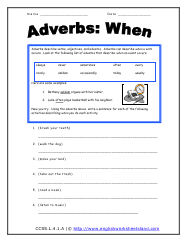Adverb Worksheets To Print:
What Are Adverbs? - What does that adverb tell you (how, when, or where)?
In Disguise - See if you can find those sneaky little words.
A Verb's BFF - This sentences need a good rewrite and you are just the person to do it.
When? - A great active activity for all learners at this level.
Adjectives to Adverbs - Numbers of syllables are a great indicator for the use of words.
Hidden Adverbs - Find the hidden adverbs in the forest. Circle the adverbs you find.
Up and Down Adverbs - Write the comparative and superlative forms of the adverbs.
Adverb Race - If you find them all and cross the finish line, he wins. Be careful, though.
Use Those Adverbs - Pick 5 adverbs from the word bank to include in your text message. Circle the adverbs you use.
Comparatives and Superlatives - Beside the turtles, write the comparative and superlative forms of the given adverbs.
Filling Adverbs - Write a haiku about butterflies. Use at least three adverbs in your haiku from the cloud banks.
Fishing for Adverbs - In the creek are many adverbs. Catch all the adverbs by circling them. Don't catch the verbs, adjectives, or nouns, though!
Where Are The Adverbs? - The verb is underline in each sentence. Find and circle the adverbs that modify each verb.
Chores - You will find a list of chores. On the line, write a sentence containing an adverb that describes how you do that chore. Underline the adverb.
What's Been Modified? - Tell if the word it describes (or modifies) is a verb, an adjective, or an adverb.
Question Answering - Complete each sentence by adding the missing term. Use the clues inside the parentheses to help you.
Modify Verbs - You will identify the term in each sentence and then also point out the verb that it modifies and changes slightly.
Writing with Them - Rewrite each sentence, adding information that answers the question in parentheses.
Recognition - You will spot them in sentences, but in some cases the sentences will completely lack them.
Add Details - Rewrite each sentence three times. Each time, add information that answers the question in the left column.
How, How Much, Where, or When? - Read each sentence. What kind of information is the adverb providing? Write the correct letter on the line.
Answer Questions - Write five sentence about each picture. In each sentence, use a term that answers the prompt.
Describe Verbs - This is a brainstorming activity that we suggest that you use as complete class.
Find Them - Sort through all thirty-five of these words.
Transformers - You will change one part of speech into a completely different form to make the sentences pop a bit more.
How to Use -ly - You can turn many adjectives into adverbs by adding - ly to the end of the adjective. If the adjective ends in a consonant then y, change the y to i before adding -ly. If the adjective ends in a vowel then an l, keep the l and add an additional -ly.
Express Frequency - These terms explain how often something occurs regularly.
Describe the Verbs - You will find a way to match all of the words as needed.
Comparative Forms - These will often require you to think up an accompanying word to complete your mission.
Writing with Them - We give you a word and you use it in your very own sentence. Get creative with it!
More Worksheets on This Topic:
Adverbs vs. Adjectives - They sever similar purposes, but we spend some time showing you the clear difference between the two.
Combining, Expanding, and Reducing Sentences - We show you a hands-on approach to editing and adjusting your work to make more powerful sentences.
Conjunctive Adverb for Ideas - When using them in this context, students often have a bit of difficulty with it.
Conjunctive Adverb for Opinions - You will find that you will use these terms for this purpose when working on research papers.
Comparative / Superlative Uses - Explore the different uses of these terms in your own writing purposes.
Frequency Adverbs - Learn how to clarify how often something occurs.
Relative Pronouns and Adverbs - You will learn that how to differentiate between them is how the clauses are connected.
The Words They Modify - We look at the most basic form of this skill.
When to Use Them - This can be a difficult for students well into their middle school years. Why not work on mastering it now?
Get FREE English Worksheets In Your Email

